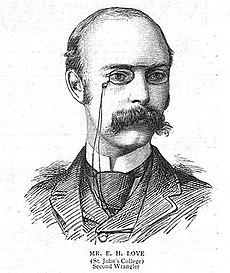Augustus Edward Hough Love
Augustus Edward Hough Love (born April 17, 1863 in Weston-super-Mare , England , † June 5, 1940 in Oxford ) was an English mathematician .
Live and act
Augustus Edward Hough Love was the son of a surgeon and coroner. In 1882 he began studying mathematics at St. John's College , Cambridge, on a scholarship he won . In 1884 he was Second Wrangler in the Tripos exams and became a Fellow of the College in 1886 . In 1887 he won the Smith Prize . In 1894 he was accepted into the Royal Society . In 1899 he was appointed to the Sedleian Professorship for Theoretical Physics (Natural Philosophy) at Oxford University and gave up his Fellow status in his old college (but became an honorary fellow in 1927 ). In 1927 he became a Fellow of Queen's College in Oxford .
Love was known for his much work on theoretical continuum mechanics, especially his clearly written, historically sound textbook on elasticity theory . In 1911 he was the first to set up a mathematical model for the propagation of the Love waves named after him (see: Seismic wave ).
In 1911 he received the Adams Prize for his work on earthquake waves . The Royal Society awarded him the Royal Medal in 1909 and the New Year's Medal in 1937 . In 1926 he received the De Morgan Medal of the London Mathematical Society (LMS), of which he was secretary from 1895 to 1910. From 1912 to 1913 he was President of the LMS. In 1930 he became a corresponding member of the Académie des Sciences in Paris.
He never married. His youngest sister ran the household for him.
Fonts
- A Treatise on the Mathematical Theory of Elasticity , 2 volumes, 1892, 1893
- Hydrodynamics , Encyclopedia of Mathematical Sciences 1901
literature
- Karl-Eugen Kurrer : The History of the Theory of Structures. Searching for Equilibrium . Berlin: Ernst & Sohn 2018, p. 1025 (biography), ISBN 978-3-433-03229-9 .
Web links
- Literature by and about Augustus Edward Hough Love in the catalog of the German National Library
- John J. O'Connor, Edmund F. Robertson : Augustus Edward Hough Love. In: MacTutor History of Mathematics archive .
- Augustus Edward Hough Love in the Mathematics Genealogy Project (English)
Individual evidence
- ^ List of members since 1666: Letter L. Académie des sciences, accessed on January 15, 2020 (French).
| personal data | |
|---|---|
| SURNAME | Love, Augustus Edward Hough |
| BRIEF DESCRIPTION | English mathematician |
| DATE OF BIRTH | April 17, 1863 |
| PLACE OF BIRTH | Weston-super-Mare , England |
| DATE OF DEATH | June 5, 1940 |
| Place of death | Oxford |
